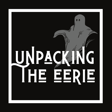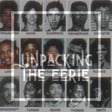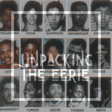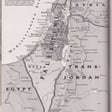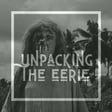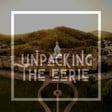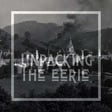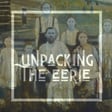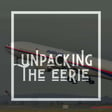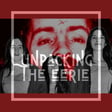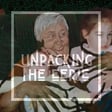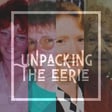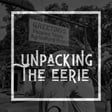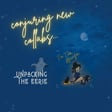Introduction to 'Unpacking the Eerie'
00:00:06
Speaker
And I'm Shaina, and you're listening to Unpacking the Eerie.
00:00:10
Speaker
A podcast that explores the intersections of our dark and morbid curiosities through a social justice lens.
Late Night Recording and Episode Tone
00:00:28
Speaker
With another mini.
00:00:29
Speaker
With another mini.
00:00:38
Speaker
Running a little sleepy.
00:00:39
Speaker
I also am drinking some whiskey.
00:00:41
Speaker
This one's going to be pretty short and sweet, I think.
00:00:47
Speaker
I don't know if sweet is the right operative word, actually.
00:00:49
Speaker
But anyways, I do think, though, that this is like a palate cleanser kind of topic, just because I don't think I can think of any content warnings for this one.
00:01:04
Speaker
First ever without any content warnings.
00:01:07
Speaker
We're still unpacking and there's still something eerie.
Mysteries of Lake Washington Begin
00:01:10
Speaker
But, you know, if you were listening to others and you're like, you know, I could really do without this like sexual violence shit or suicide shit or this child abuse shit.
00:01:19
Speaker
This one's a great one.
00:01:20
Speaker
It's interesting, especially if you are.
00:01:23
Speaker
Residing in Washington.
00:01:32
Speaker
So today we're going to be talking about Lake Washington, specifically what lies beneath Lake Washington.
00:01:40
Speaker
I don't know about you, but I see people swim.
00:01:43
Speaker
I mean, I know it's huge, first of all.
00:01:45
Speaker
But there's so many parts of Lake Washington that I'm just like, I see people out in the water and I'm like, I don't know.
00:01:50
Speaker
Something about it.
00:01:50
Speaker
I'm swimming in it.
00:01:52
Speaker
It's probably dirty, but, you know, whatever.
00:01:56
Speaker
Especially over by Gasworks.
00:01:59
Speaker
Oh, I've never swam.
00:01:59
Speaker
No one should be doing that.
00:02:00
Speaker
And those bitches are doing that.
00:02:02
Speaker
I think it's literally like a warning.
00:02:04
Speaker
You should not do that.
00:02:06
Speaker
It's like gives Green Lake vibes in the dirtiness category.
00:02:10
Speaker
People really swim in Green Lake and I think it's so gross.
00:02:15
Speaker
I was like, hell no.
00:02:16
Speaker
I bet you there's bodies in there.
00:02:17
Speaker
And they're like, no, there's not, Shane.
00:02:18
Speaker
Why are you always talking about bodies in there?
00:02:20
Speaker
And then six months later, a body was found in there.
00:02:23
Speaker
So, you know, people do be dumping.
00:02:27
Speaker
I'll start with opening on like, what the fuck is Lake Washington for people who don't know how big it is.
Lake Washington's Location and Significance
00:02:32
Speaker
I'll give you a little lay of the land.
00:02:34
Speaker
So Lake Washington is a very large freshwater lake adjacent to Seattle, Washington.
00:02:41
Speaker
It's the largest lake in King County and the second largest natural lake in the state of Washington.
00:02:48
Speaker
The first one is Lake Chelan.
00:02:50
Speaker
So it borders Seattle in the west.
00:02:52
Speaker
There's Bellevue and Kirkland on the east, Renton on the south, Kenmore on the north, and it also surrounds Mercer Island.
00:03:00
Speaker
The lake is fed by the Sammamish River at its north end and the Cedar River at its south.
00:03:06
Speaker
So it touches a great deal of this whole area in Washington.
00:03:10
Speaker
It's a huge, huge lake.
00:03:12
Speaker
Apparently Lake Washington is a ribbon lake, which I guess is a type of lake that's long and narrow and finger-like, and there are specifically lakes that are excavated by glaciers.
00:03:22
Speaker
Obviously, before the lake was Lake Washington, which is named after George Washington for reasons that I can't explain to you.
00:03:29
Speaker
I mean, I think Washington as a state is named after Washington.
00:03:32
Speaker
For what reason, I'm not really sure.
00:03:33
Speaker
I don't know, though.
00:03:36
Speaker
Like, he doesn't even go here.
00:03:39
Speaker
He doesn't even go here.
00:03:40
Speaker
Do you ever go to this school?
00:03:43
Speaker
I just have a lot of feelings.
00:03:54
Speaker
I thought of that really disturbing fact about George Washington and how we were told that he had wooden teeth and he did not have wooden teeth.
00:04:04
Speaker
They took teeth from enslaved people.
00:04:07
Speaker
And they made them into his dentures.
00:04:11
Speaker
I learned this a couple years ago.
00:04:14
Speaker
Anyways, I said no content warnings and clearly I'm a content viewer.
00:04:20
Speaker
Because that is so disturbing.
00:04:22
Speaker
But I just remember learning about that and then being on MLK Way and also seeing the shape of Washington's face on the highway sign.
Cultural Heritage of Lake Washington
00:04:35
Speaker
And they were just side by side.
00:04:37
Speaker
And I felt like, wow, how uniquely American is this?
00:04:40
Speaker
Anyway, that's what Lake Washington is named after.
00:04:43
Speaker
Obviously, it was here long before the U.S. was considered a thing.
00:04:48
Speaker
For folks who don't know, this is Duwamish territory.
00:04:51
Speaker
It's also home to the Coast Salish people.
00:04:54
Speaker
Its original name was La Chute Seed.
00:04:57
Speaker
It roughly translates to great amount of water.
00:05:00
Speaker
and people, which referred to the people who stayed along the coastline of the lake.
00:05:06
Speaker
There's a lot of fish in these waters.
00:05:08
Speaker
It's known for the sockeye salmon, the coho salmon, the chinook salmon, rainbow trout, largemouth bass, smallmouth bass, yellow perch, and black crappie fish that are all around the area.
00:05:19
Speaker
Okay, random fact that I found out over the weekend is apparently...
00:05:25
Speaker
They put non-native fish in bodies of water so that people can fish them.
00:05:34
Speaker
Yeah, the fuck-ups fucks up the ecosystem.
00:05:40
Speaker
Well, this is kind of reminding me, or when I'm seeing all the salmon, I'm thinking about that paper we read in Historical Trauma about how...
00:05:47
Speaker
There was like public health researchers who worked with a local tribe who, how do I start this whole thing?
00:05:54
Speaker
Karina Walters has a thing about original instructions and how a great deal of historical trauma comes from a people's not being able to access their original instructions.
00:06:04
Speaker
So like their life ways, their cultural instructions.
00:06:06
Speaker
practices, language, stories, all of that being disrupted and then you not being able to access a time before colonization, violence, a disruption of those life ways is the best way I can describe it from just my brain.
00:06:21
Speaker
And she was talking about how using that framework, they worked with a tribe nearby to reinvigorate practices around canoeing
00:06:31
Speaker
and fishing for salmon during salmon season.
00:06:34
Speaker
And they connected it to positive correlations to heart health.
00:06:39
Speaker
And so they found that basically the strongest thing you can do to revitalize the health of a community is to restore people's original life ways because there's something really intrinsic about being connected to nature that way.
00:06:54
Speaker
When I was seeing all the salmon that was in there, I was thinking about that.
00:06:58
Speaker
Fun fact, I'll try to find the articles really beautiful.
00:07:00
Speaker
Anyways, so all this fish lives in there, but you know what else is in there?
00:07:08
Speaker
Probably a lot of shit.
00:07:09
Speaker
There's this article that I read that kind of paints the scene.
00:07:13
Speaker
They said, at the southern end of Lake Sammamish, just off Greenpoint,
00:07:17
Speaker
Yeah, that's so long.
00:07:34
Speaker
And so this underwater forest exists in Lake Sammamish, but it also exists in a great deal of Lake Washington.
00:07:42
Speaker
And you would never know because you can't see at the bottom.
00:07:44
Speaker
And I watched a video of divers going in there.
Discovery of Underwater Forest
00:07:52
Speaker
And of course, this white dude is like, I had a great time going through the... Creepy underwater forest.
00:07:58
Speaker
Yeah, what the fuck?
00:08:00
Speaker
He said it's pitch black.
00:08:02
Speaker
And he's like, it's so dark that sometimes you can't tell if the water's moving or if you are.
00:08:07
Speaker
And so it's like really disorienting to be down there.
00:08:11
Speaker
I didn't know it was so deep.
00:08:12
Speaker
It's... Yeah, it's way, way down there.
00:08:16
Speaker
And it's been there for ages.
00:08:17
Speaker
And apparently the oxygen levels are so low and it's so cold down there that the trees are so, like, nearly perfectly preserved.
00:08:26
Speaker
And underneath, there are several hundred trees.
00:08:30
Speaker
standing upright or tilted about 45 degrees.
00:08:32
Speaker
So it literally is like a big underwater forest.
00:08:38
Speaker
Little eerie, little ominous.
00:08:40
Speaker
I love the idea of some lore existing somewhere about these trees having ghosts or spirits or whatever, since that seems to be like an echo across the world.
00:08:52
Speaker
And then wondering what it does or how does the story change now that it's submerged in water?
00:08:59
Speaker
Because there's also all this lore around water being cleansing.
00:09:02
Speaker
Are they released?
00:09:04
Speaker
I just wonder what the folklore is.
00:09:07
Speaker
I didn't run into any.
00:09:08
Speaker
Maybe somebody holds it.
00:09:10
Speaker
Three groups of these trees.
00:09:13
Speaker
Two off Mercer Island.
00:09:13
Speaker
But then there's also one in Lake Washington just north of Kirkland.
00:09:17
Speaker
So if you've ever been in those areas.
00:09:20
Speaker
The first time that people learned about this was in 1992.
00:09:25
Speaker
Oh, that's so late.
00:09:27
Speaker
I mean, they said that sailors and stuff in the early 1900s knew that there were logs and wood that was coming out of the water.
00:09:35
Speaker
It would disrupt the waterways, I guess, and it would cause crashes and what have you, which kind of feels like Mother Nature's kind of protection, like a booby trap almost.
00:09:46
Speaker
Doesn't it feel that way?
00:09:47
Speaker
Yeah, she does do things like that.
00:09:49
Speaker
The way that there is an outrageous amount of boats that are just at the bottom of that lake, the crashes in that lake are outrageous.
00:09:57
Speaker
And I had no idea.
Historical Earthquake Impact
00:09:59
Speaker
But I learned that, like, it was because all of these trees were in there.
00:10:04
Speaker
It disrupted their pathways so they couldn't get through.
00:10:08
Speaker
And so, I don't know.
00:10:09
Speaker
They just crashed?
00:10:10
Speaker
It just feels a little poetic is what I'm, you know?
00:10:14
Speaker
And I mean, so we figured out that this happened, like, in 1982 with some depth at least.
00:10:20
Speaker
But the earliest diver, I guess, was in the water in 1958.
00:10:28
Speaker
Diver, his name was Leader Hockett?
00:10:32
Speaker
And he was diving in the water and he said that he became all of a sudden engulfed in a densely forested bottom.
00:10:39
Speaker
And he was like, what's going on?
00:10:41
Speaker
That is so jarring.
00:10:44
Speaker
This is why I was like, diving is not for me.
00:10:47
Speaker
Who do I think I am?
00:10:49
Speaker
Puny little me going into the dark depths of a body of water like that.
00:10:54
Speaker
No, it just reminds me of the divers who go into Lake Lanier.
00:10:58
Speaker
Oh my god, the guy who fell into the well.
00:10:59
Speaker
Do you remember that story?
00:11:02
Speaker
Where he was like, all of a sudden I fell so deep and it was very cold and dark.
00:11:06
Speaker
And I think I had fallen into a well.
00:11:11
Speaker
So how did this happen?
00:11:13
Speaker
They don't know for sure.
00:11:14
Speaker
There's like some scientists who are going back and forth about the accuracy of being able to be like, this is exactly when it happened.
00:11:22
Speaker
But so researchers use carbon dating from the submerged trees.
00:11:26
Speaker
They also did like study the rings to see how many of them were.
00:11:31
Speaker
The estimation is that it happened in 900 CE.
00:11:34
Speaker
And it was caused by a massive earthquake that's like 7 to 7.5 magnitude.
00:11:40
Speaker
In this 1992 article, the Seattle Times described it like this.
00:11:43
Speaker
The quake caused rock avalanches in the Olympics, lifted southeastern Bainbridge Island 20 feet and Alki Point 13 feet, produced a tsunami that hit the southern tip of Whidbey Island, drowned West Point with a monster wave, and sent trees sliding 200 to 400 yards into Lake
Future Earthquakes and Preparedness
00:12:02
Speaker
I was just sitting here for a while imagining what that could have looked like and sounded like and felt like.
00:12:08
Speaker
What does that even... I can't imagine it.
00:12:10
Speaker
There's... I mean, I've been thinking about earthquakes since last week.
00:12:15
Speaker
And it's scary to think about them.
00:12:20
Speaker
I was sitting here thinking like, oh, you know, the kind of eerie that we have not covered is the real emergency of climate crisis.
00:12:27
Speaker
And I mean, I was thinking like, what's going to happen?
00:12:30
Speaker
What happens if there's an earthquake?
00:12:32
Speaker
You can't really predict them at all.
00:12:34
Speaker
And then I was like, but why are they not preparing us for it?
00:12:38
Speaker
Like, why don't we know how...
00:12:41
Speaker
to manage ourselves during an earthquake that is inevitably going to happen.
00:12:48
Speaker
I mean, I grew up in California where earthquakes were really common.
00:12:51
Speaker
Like, really common.
00:12:53
Speaker
I have been present for a few earthquakes in Asia, so I think they're more common.
00:12:59
Speaker
there too but we haven't had one in a long time and I feel like that's scarier yeah for sure because of the pressure that builds yeah there hasn't been one here in a long time either and there's typically yeah I was looking at well
00:13:13
Speaker
I mean, the last time they had a catastrophic one, it was like a thousand years ago, they said.
00:13:18
Speaker
So if we were to have an earthquake at the same magnitude, for whatever reason, the way that Seattle and the surrounding areas are set up, we'd be in this position.
00:13:30
Speaker
Just... You're just fucked.
00:13:33
Speaker
Just going into Lake Washington?
00:13:35
Speaker
Well, I mean... Going 20 feet in the air?
00:13:39
Speaker
In 2015, they found a leak at the bottom of the Pacific Ocean that's near the coast.
00:13:44
Speaker
And they found that the thing that was leaking was the lubricant that keeps the tectonic plates lubricated.
00:13:54
Speaker
And they said that, you know, once a certain amount of it is leaked, it's going to cause...
00:14:01
Speaker
like a nine point magnitude earthquake that's going to hit the Pacific coast.
00:14:07
Speaker
And they've known about it since 2015.
00:14:09
Speaker
And I was like, why have I never heard about this till I Googled Seattle earthquake last week?
00:14:16
Speaker
It's eight years later.
00:14:19
Speaker
What's anyone doing about this leak?
00:14:22
Speaker
You probably can't do anything about it, but you can at least prepare us for what we're supposed to do when the earthquake happens, bro.
00:14:28
Speaker
And then what follows the earthquake is a tsunami, which is also freaking scary.
00:14:36
Speaker
I was watching a reenactment of this online.
00:14:41
Speaker
Like a digital one.
00:14:44
Speaker
And, I mean, the water...
00:14:47
Speaker
Went over these ancient trees.
00:14:51
Speaker
Like rose to the top of the trees, man.
00:14:56
Speaker
Respect nature, man.
00:14:59
Speaker
Again, the roots are so deeply rooted that they still to this day stand up.
00:15:04
Speaker
So it wasn't like this landslide had these trees toppling over.
00:15:07
Speaker
It was such a deep rooted thing where it split and fell so perfectly into the water.
00:15:16
Speaker
And then a lot of the documentation that I found more recently is done by this local diver, Ben Greiner.
00:15:25
Speaker
He explores via sonar technology.
00:15:29
Speaker
He said it's a very disorienting dive.
00:15:32
Speaker
He's the guy who earlier was like,
00:15:34
Speaker
It's pitch black at that depth.
00:15:36
Speaker
You can't really tell what's going on.
00:15:38
Speaker
Not only are there these giant forests in the depths of this water, but there are about 400 boats beneath the surface.
Historical Artifacts and Wrecks
00:15:49
Speaker
Ferries, barges, three Navy minesweepers, mostly in the shallow waters off of Kirkland, where the shipyards used to be.
00:15:56
Speaker
Now they called it a graveyard for wrecked boats.
00:16:00
Speaker
Ben says that these are full-on, full-size ferries at the bottom, right underneath all the yachts that are parked there now.
00:16:08
Speaker
Why don't they take them out?
00:16:12
Speaker
No one ever cleans this lake, they said.
00:16:15
Speaker
And then they said, as for the Minesweepers, one day they were docked, the next day they were gone.
00:16:19
Speaker
I'm going to go into an article that was posted by KUOW, which is like a public radio station.
00:16:25
Speaker
Yeah, it's NPR, Seattle's NPR station.
00:16:27
Speaker
Okay, there it is.
00:16:29
Speaker
It's for the Local Wonder Project.
00:16:31
Speaker
The person who is hosting it was answering a question from a listener.
00:16:35
Speaker
What is on the bottom of Lake Washington?
00:16:37
Speaker
So this person went on a boat with five scuba divers.
00:16:41
Speaker
One of them was this Ben guy.
00:16:43
Speaker
And they would map the whole floor with sonar.
00:16:47
Speaker
And they started off at the Magnuson Park boat launch.
00:16:51
Speaker
Mike Racine, who was the captain, pointed to a map of the lake on the computer screen.
00:16:56
Speaker
It was covered with hundreds of markers called targets.
00:17:00
Speaker
And then they just picked one of them to go explore.
00:17:03
Speaker
Check out target 590.
00:17:04
Speaker
And then they went to the spot.
00:17:07
Speaker
Wow, these divers are like so into this.
00:17:10
Speaker
Yeah, Mike goes, when I'm out here, sometimes I imagine what it would be like if there was no water in Lake Washington.
00:17:15
Speaker
What would you see?
00:17:17
Speaker
I have never in my life thought that.
00:17:21
Speaker
You know, like, that's not been a thought.
00:17:22
Speaker
But now I'm out there like, wow.
00:17:24
Speaker
You would see forests, I guess.
00:17:26
Speaker
Yeah, I mean, the writer says you would see an underwater museum, a place where you can't go more than a few feet without discovering something.
00:17:34
Speaker
And the thing you'd discover out here just off the boat launch is big.
00:17:38
Speaker
Just to the left, I guess they had immediately seen a huge World War II era bomber.
00:17:44
Speaker
There's, like, a machine gun sticking out of it.
00:17:48
Speaker
The bomb bay doors are opened.
00:17:51
Speaker
It crashed in 1956 and it rests at the bottom 140 feet beneath the water.
00:17:56
Speaker
More people water ski, man.
00:17:59
Speaker
Isn't that juxtaposition kind of eerie?
00:18:03
Speaker
I didn't know people water skied on Lake Washington.
00:18:05
Speaker
They do everything on Lake Washington, man.
00:18:07
Speaker
They're really out there.
00:18:08
Speaker
And to like, I don't know.
00:18:09
Speaker
I'm just like into these things that like embody so much violence.
00:18:15
Speaker
They also said that Lake Washington is a treasure trove for old plane wrecks.
00:18:19
Speaker
They are at least seven at the bottom of the lake.
00:18:21
Speaker
Why aren't they taking these things out?
00:18:23
Speaker
They're too big, maybe.
00:18:24
Speaker
I don't understand.
00:18:29
Speaker
But they were talking about how it feels like wartime history frozen in time down there.
00:18:34
Speaker
And then in the middle of the lake are about, there's like a dozen coal cars that were submerged.
00:18:39
Speaker
It's the oldest wreck that happened 139 years ago.
00:18:44
Speaker
And a lot of those are just upright loaded with coal.
Lake Washington as a Dumping Ground
00:18:48
Speaker
They sank in a storm.
00:18:50
Speaker
It was like coal cars that were heading from Newcastle to Seattle at the time.
00:18:54
Speaker
They found these minesweepers at the bottom and they're so big you swim right through the old corridors and they'd be doing that.
00:19:00
Speaker
These battleship ships.
00:19:03
Speaker
Yeah, and then they said some of the boats sank in fire, some of them in storms.
00:19:08
Speaker
And then for a while when a boat got old, the standard practice was just to sink it.
00:19:13
Speaker
They just didn't want the boat and they just like... You didn't want to like break it apart and reuse?
00:19:21
Speaker
Yeah, so there's like polluting.
00:19:24
Speaker
It's like how they throw trash into space.
00:19:31
Speaker
That's why the aliens are here.
00:19:32
Speaker
They're like, can you stop?
00:19:35
Speaker
They found the culprits.
00:19:37
Speaker
They're like, who is throwing your trash into space?
00:19:46
Speaker
Oh my God, it's us.
00:19:48
Speaker
It's us, we do that.
00:19:50
Speaker
Anyway, he said that you'll see giant concrete blocks in the back of the boats where people tried to force them down underwater until they sink.
00:19:57
Speaker
Anything that people wanted to hide is on the bottom of Lake Washington.
00:20:00
Speaker
So I'm, okay, again with the bodies, man.
00:20:06
Speaker
Right, if the knowledge is that so much shit just lives at the bottom and no one is designated to clean it up,
00:20:12
Speaker
Yeah, I guess no one's looking there.
00:20:15
Speaker
No, and then people can't go in there and take stuff, though.
00:20:18
Speaker
Like, it's owned by the state.
00:20:19
Speaker
The state has decided, you know.
00:20:22
Speaker
There was a guy, I don't know, a while back who, like, dove in there and tried to steal some of the wood so that he can make furniture out of it because apparently, like, reclaimed wood from the ocean is, like, really sturdy and you can sell it for a lot of money.
00:20:38
Speaker
He got prosecuted.
00:20:41
Speaker
And then this is an ominous part of this article.
00:20:44
Speaker
He said it's been this way for centuries.
00:20:47
Speaker
Lake Washington is a dumping ground for things people want to disappear.
00:20:50
Speaker
Garbage, boats, but also other things.
00:20:51
Speaker
Two underwater forests, a baby in a bag from a medical research facility, the body of a dog found last month tied to concrete.
00:20:59
Speaker
possibly a submerged village.
00:21:01
Speaker
It says, the lake's deep, inky, black waters hide things from the casual swimmer or boater.
00:21:05
Speaker
They sink into the sludge of silt and mud at the bottom.
00:21:08
Speaker
The cold water, just 10 degrees above freezing at the bottom, preserves all of them, which means they're only forgotten until someone finds them.
Mapping Underwater Targets
00:21:15
Speaker
Nobody takes out the trash at the bottom.
00:21:18
Speaker
There's trash all over the lake.
00:21:20
Speaker
These divers find these trash bags all over the lake, and they're like, it freaks me out, I just don't open them.
00:21:26
Speaker
So I'm just like, what the fuck is in these bags?
00:21:28
Speaker
Yeah, we don't want to see some chopped up stuff.
00:21:32
Speaker
I mean, we know about Al-Kai.
00:21:34
Speaker
We know about the chopped up in general.
00:21:38
Speaker
And apparently they have 800 targets on the sonar map.
00:21:42
Speaker
They've only explored 200.
00:21:44
Speaker
That's after diving at most every week for the past eight years.
00:21:52
Speaker
Every week for the last eight years.
00:21:57
Speaker
So there's also obviously a lot of trash and shit.
00:22:00
Speaker
Not only is it home to like this underground, like underwater forest, which I think is really ominous and kind of beautiful at the same time.
00:22:06
Speaker
There's like all these remnants of...
00:22:09
Speaker
quote-unquote pioneer settler history of both purposeful and kind of disastrous crashes.
00:22:18
Speaker
Of like wartime vessels, which something about the juxtaposition of like vessels for violence and the landscape of... Vessels for leisure.
00:22:30
Speaker
Just living on top and like people leisurely being on top.
00:22:33
Speaker
And then also just kind of being accompanied by this... Yeah, it's like they pan down.
00:22:38
Speaker
Yes, and then like there's a forest.
00:22:41
Speaker
There's so much there.
Reflections on Lake's Eerie Nature
00:22:43
Speaker
Thank you for sharing that.
00:22:44
Speaker
That was very interesting.
00:22:45
Speaker
Now I will see it very differently every time I'm there.
00:22:50
Speaker
It will never be the same.
00:22:51
Speaker
I still might go in there.
00:22:55
Speaker
Yeah, I mean, you'd have to go pretty far.
00:22:58
Speaker
Stay close to the shore.
00:23:04
Speaker
And then someone like fucking, what, killed their dog?
00:23:08
Speaker
They don't have any stories.
00:23:11
Speaker
I mean, these are just divers.
00:23:12
Speaker
It's just everyday people.
00:23:14
Speaker
They're not going in there to investigate things that happen.
00:23:16
Speaker
They just find weird things.
00:23:19
Speaker
I just feel like they're going to run into something wild down there at some point.
00:23:22
Speaker
And it's so cold that those things probably are preserved for a long time.
00:23:26
Speaker
The end of that article was kind of cheesy.
00:23:29
Speaker
It was like, the question is not what's in the bottom of Lake Washington.
00:23:32
Speaker
The question is what isn't.
00:23:33
Speaker
I thought I was going to say the question is who is.
00:23:38
Speaker
But, you know, yeah, I guess there's probably a lot of shit down there.
00:23:42
Speaker
Anyways, that's that.
00:23:45
Speaker
Pay your respects to the trees.
00:23:49
Speaker
Climate change is real.
00:23:51
Speaker
Climate crisis is real.
00:23:54
Speaker
I don't know what else to say about that.
00:23:56
Speaker
It just feels like.
00:23:57
Speaker
Do what you can to respect nature, at least.
00:24:03
Speaker
Just feels like a cautionary tale, you know?
00:24:07
Speaker
Like, there's something about that earthquake that seems so scary and so real and so possible.
00:24:18
Speaker
Kind of a palate cleanser, kind of a bummer.
00:24:21
Speaker
At least no trauma.
Acknowledgment of Patreon Supporters
00:24:35
Speaker
Thanks for listening and for supporting us.
00:24:38
Speaker
You can find us on Instagram and Facebook at Unpacking the Eerie, on Twitter at Unpack the Eerie, and on our website at www.unpackingtheerie.com.
00:24:51
Speaker
Yes, and special thanks to all of you who subscribe to our Patreon.
00:24:56
Speaker
As we've mentioned before, we do all the research for this, we edit, and we don't have any sponsorships or ads.
00:25:05
Speaker
So Patreon support is super helpful in just keeping this project sustainable, keeping the Buzzsprout subscription going, paying for the website, all the stuff.
00:25:15
Speaker
So thank you so much.
00:25:17
Speaker
Sari, Liz, Clifton.
00:25:19
Speaker
Jill, Victoria, and Lindsay.
00:25:21
Speaker
Lauren, Vivian, Valerie.
00:25:24
Speaker
Micheline, Montana, Katrina.
00:25:26
Speaker
Raina, Allie, Jake.
00:25:28
Speaker
Drithi, Daphne, and Katie.
00:25:30
Speaker
Vern, Meredith, H, and Vince.
00:25:33
Speaker
To April, Aaron, and Ellen.
00:25:35
Speaker
And to Brittany, Alyssa, and Meredith R. Yay, thank you so much.


